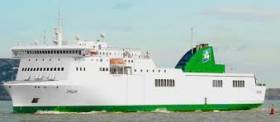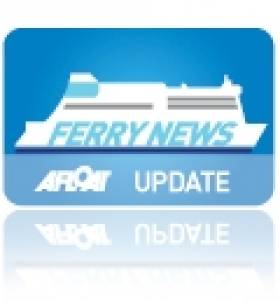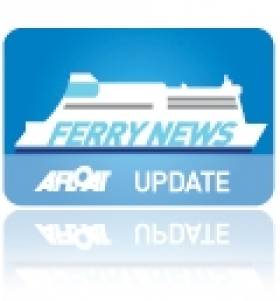Displaying items by tag: IrelandFrance routes
#FurtherCancellations – In addition to Brittany Ferries cancelled sailings this weekend on the Cork-Roscoff route, further disruption to passengers heading to and from France has arised as Irish Ferries Dublin-Cherbourg sailings are also not in service.
Technical problems of Brittany Ferries flagship, Pont-Aven as previously reported on Afloat.ie had forced the cancellation of last night’s inward bound sailing to Cork and also today’s outbound crossing returning to Roscoff.
On one of Irish Ferries French routes, the ropax Epsilon is also subject to technical reasons and this has led to the cancellation of this weekend's Dublin-Cherbourg round trip sailings. The disruption follows cancellations by Epsilon that also serves on the Dublin-Holyhead route. Passengers having been transferred onto alternative vessels serving on the Welsh link.
For latest sailing updates for Brittany Ferries click HERE and for those with Irish Ferries click HERE.
Alternative sailings on Ireland-France routes are Irish Ferries other continental services, Rosslare-Cherbourg and Rosslare-Roscoff that began operating this season a fortnight ago in early May.
Also running a continental service and out of the Wexford port is Stena Line’s Rosslare-Cherbourg service, for details click HERE.
Dublin Ferryport Opens Up 'French Connection' Coincidence
#FerryConnection - By coincidence Irish Ferries new French route's ferry Cartour Epsilon shares Dublin Port's main ferry terminal with a rival ferry that also operated on the same route more than a decade ago, writes Jehan Ashmore.
That ferry is Stena Line's ro-pax Stena Nordica, which previously served P&O Ferries as their European Ambassador for two seasons in 2002 and 2003 on the Dublin-Cherbourg route in which Irish Ferries only re-opened in January.
With yesterday's announcement of Stena Line acquiring Celtic Link Ferries operations between Rosslare and Cherbourg, the Normandy port is the common denominator in these French connections to Wexford and the Irish capital. Incidently, prior to Celtic Link operating the route P&O had also ran this link to France.
Stena Nordica currently operates the Dublin-Holyhead route in tandem with Stena Adventurer. During her career with P&O for whom she was built in 2000, the European Ambassador was launched firstly on the Dublin-Liverpool route. The ro-pax was later switched to a second UK route port, by using a then newly constructed Welsh port of Mostyn on the Dee Estuary that shares the border with England.
European Ambassador would operate the Welsh route during the week and at weekends make a round-trip on the French service. On occasions she would make en-route calls to Rosslare. Likewise, Cartour Epsilon, which as previously reported also called to the Wexford port albeit on initial sailings last month for a contract to import trade vehicles.
The use of European Ambassador as single-ship serving two routes is similar to Irish Ferries 'Epsilon' running weekday sailings to Holyhead and at weekends to Cherbourg.
Unlike Stena Line's two-ship serviced Dublin-Holyhead route, Irish Ferries operate three vessels, flagship Ulysses, Epsilon and fast-ferry Jonathan Swift.
Summer Draws to a Close on Continental Seasonal-Only Routes
#SeasonalServices- As the summer holiday season draws to a close on Irish-French routes, a seasonal-only service closes next week while another competitor stretches sailings to early November.
Irish Ferries Rosslare-Roscoff route's last sailing from the Irish port is next Thursday,19 September. The corresponding return sailing from France is the following day, Friday 20 September.
Despite this Irish Ferries maintain operating Rosslare-Cherbourg sailings right up to Wednesday 18 December with the return sailing from Normandy the next day, Thursday 19 December. Click here for sailing schedule.
Brittany Ferries continue serving Cork (Ringaskiddy)-Roscoff crossings up to early November. The weekend operated route makes a final round trip starting from Roscoff on Friday, 1 November. After sailing overnight to Cork, the cruiseferry remains in port until departing later that day, Saturday 2 November to complete the season. Click for sailing schedule.
Celtic Link Ferries which also serves between Rosslare-Cherbourg, claim that they are the only operator to run sailings linking the two countries all year long.
According to the company's website, (after imputing requested sailing dates) the last sailings of 2013 are advertised with a round trip sailing departing Rosslare on Saturday 21 December.The final sailing in 2013 is the return crossing from Cherbourg on Sunday 22 December.































































